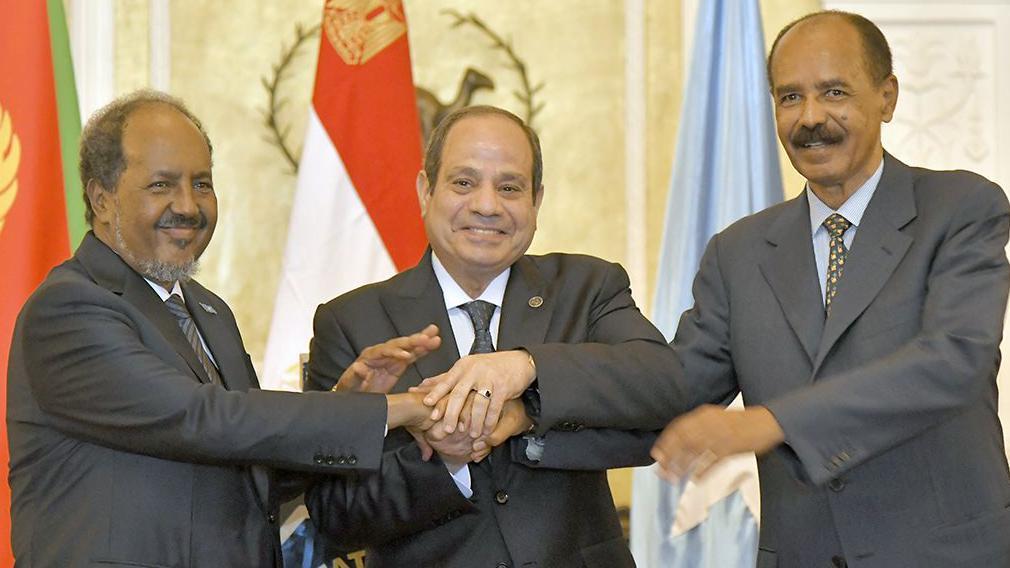The recent summit held in Asmara, Eritrea, brought together the leaders of Egypt, Somalia, and Eritrea, all of whom share complicated and often strained relations with Ethiopia. An official statement following the summit emphasized “respect for the sovereignty… and territorial integrity of the countries in the region,” which could be construed as a veiled reference to Ethiopia’s aspirations for access to a sea port, given that Ethiopia is a landlocked country. The tensions have escalated recently, particularly with Somalia strengthening its ties with both Egypt and Eritrea amid ongoing diplomatic disagreements with Ethiopia. Observers like Hassan Khannenje have articulated concerns that these increasingly close communications could lay the groundwork for a possible conflict targeting Addis Ababa, Ethiopia’s capital. However, Somali officials have downplayed any intentions of aggression, emphasizing cooperation and peaceful relations with Ethiopia.
Somalia’s Information Minister, Daud Aweis, has publicly stated that the purpose of the summit was to foster cooperation rather than confront Ethiopia. He acknowledged existing cooperation between Somalia and Ethiopia but indicated that recent decisions by Ethiopian leadership had contributed to regional instability. A photograph released by Eritrea showcased a moment of unity among the leaders, with Eritrean President Isaias Afwerki, Egyptian President Abdul Fattah al-Sisi, and Somali President Hassan Sheikh Mohamud clasping hands. The trio reportedly agreed to bolster Somali state institutions in order to effectively combat internal and external challenges, particularly focusing on enhancing the capabilities of the Somali National Federal Army in the fight against terrorism.
In the backdrop of these diplomatic developments, Ethiopia has historically played a significant role in supporting Somalia against the al-Qaeda-affiliated militant group al-Shabab. However, relations have soured as Somalia expressed outrage over a preliminary agreement Ethiopia reached earlier this year concerning the leasing of a coastal section of Somaliland, a region that Somalia regards as its territory. This turn of events highlights the sensitive dynamics in the Horn of Africa, where national boundaries and territorial claims continue to spark discord among neighboring nations.
Moreover, the geopolitical tensions involving Egypt and Ethiopia have persisted for over a decade, primarily revolving around the Grand Ethiopian Renaissance Dam (GERD) on the Nile River. Egypt perceives the construction of this dam as a potential threat to the river’s flow, which is critical for its water supply. In a display of military support, Egypt sent significant arms shipments to Somalia, further complicating the diplomatic landscape in the region. Recent deliveries included military equipment transferred via ship and military aircraft, indicating a strategic partnership between Somalia and Egypt that may be viewed with apprehension by Ethiopia.
The historical context of Ethiopian-Eritrean relations adds another layer of complexity to the current situation. Following years of animosity characterized by a brutal border war, 2018 saw a promising thaw in ties when Ethiopia’s Prime Minister Abiy Ahmed signed a “declaration of peace and friendship” with Eritrea, earning him the Nobel Peace Prize. However, the cordial relationship between the two countries deteriorated after the Ethiopian civil war in the northern Tigray region, during which Eritrea allied with the Ethiopian government. Abiy’s intention to secure access to a port on the Red Sea has again strained relationships as regional powers react to the shifting alliances.
In summary, the summit in Asmara among the leaders of Egypt, Somalia, and Eritrea reflects the complicated interplay of diplomacy, territorial disputes, and historical grudges that characterize the Horn of Africa. While the leaders publicly focused on cooperation and mutual support against terrorism and internal challenges, the underlying motivations and historical grievances suggest that deeper tensions remain unresolved. Somalia’s alignment with Egypt and Eritrea against Ethiopia, coupled with Ethiopia’s ambitions for a port and ongoing conflicts over water rights, brings considerable risk of escalation. It remains vital for these countries to engage in dialogue and cooperate effectively to navigate the obstacles facing the region and work towards sustainable peace and stability for all parties involved.

